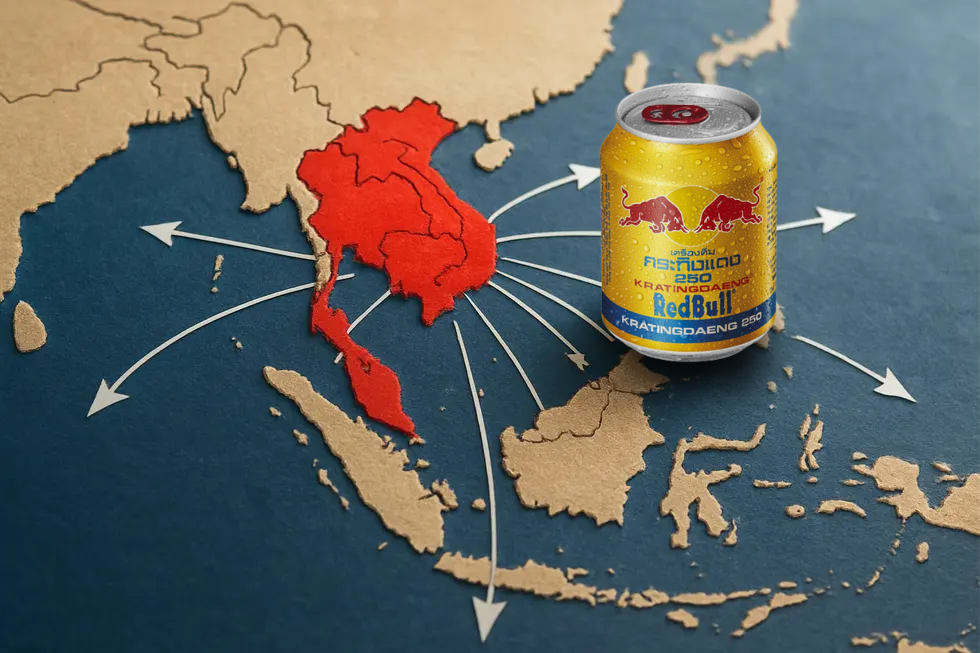No products in the cart.
Energy Drinks, Red Bull Energy Drink
Red Bull Vietnam Exporter: Navigating the Asian Energy Drink Market
The energy drink market is booming in Vietnam, and Red Bull stands out as a prominent player. Despite not being produced locally, Red Bull’s potential for export from Vietnam aligns with the country’s thriving market dynamics and regulatory environment. This article delves into the market dynamics, regulatory impacts, and strategic opportunities for Red Bull’s Vietnamese export operations, comparing them with Thailand’s, and uncovering new pathways in the Southeast Asian market.
Table of Contents
Red Bull’s Strategic Role in Vietnam’s Energy Drink Growth
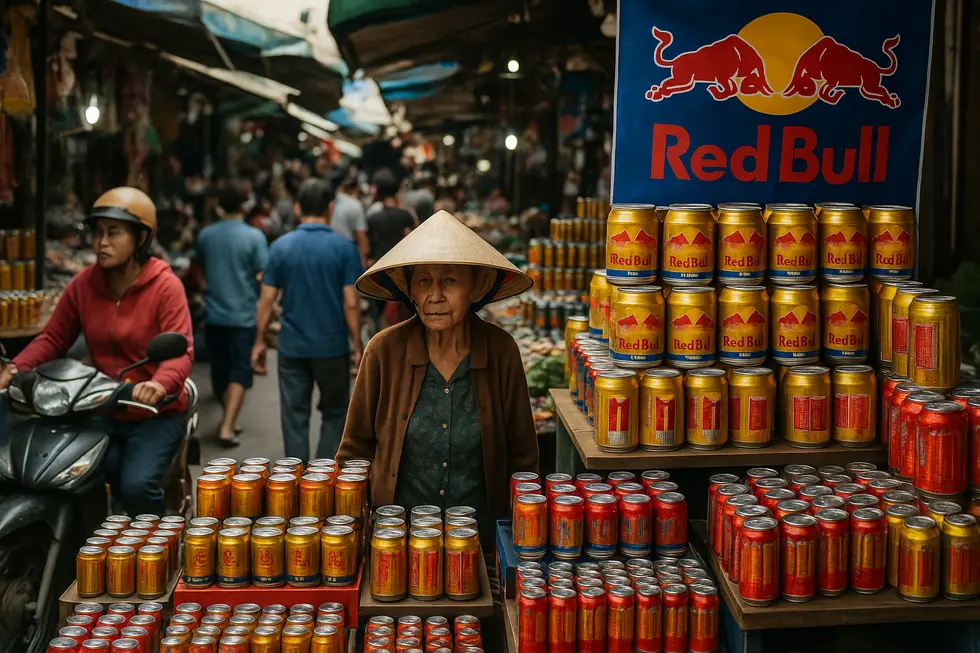
Vietnam’s energy drink market is experiencing substantial growth, fueled by rapid urbanization, rising disposable incomes, and shifts in consumer lifestyles. The beverage sector, projected to expand to USD 5.8 billion by 2026, sees energy drinks as a significant contributor. This growth reflects the increasing health consciousness among younger consumers, who seek convenient, high-functionality beverages amid their dynamic lifestyles.
In navigating this vibrant market landscape, Red Bull holds significant brand recognition, leveraging its global prominence to captivate the Vietnamese audience. Despite intense competition from innovative local producers, Red Bull’s Vietnam operations, specifically through effective importation and distribution, bolster its market presence. Strategic partnerships with cafes and bars, coupled with targeted marketing towards young adults, further cement its role.
Exploring the consumption dynamics reveals a societal penchant for on-premise venues, which have become vital to the energy drink sector’s revenue. With 98% of consumers frequenting cafes recently, Red Bull Vietnam adeptly aligns its distribution strategies to ensure product availability where lifestyle activities occur, enhancing social consumption alongside traditional beverages.
Regulatory frameworks also steer market dynamics in Vietnam. Proposed tax hikes on sugary drinks pose challenges, potentially altering pricing strategies. However, energy drinks’ positioning as functional, rather than merely sugary, beverages provides a buffer. Emphasizing health-centric benefits can mitigate the adverse effects on demand compared to regular sodas.
In summary, Vietnam’s energy drink market presents fertile ground for growth, with Red Bull strategically positioned at the helm of this expansion, Red Bull Culture Vietnam. Such dynamics underscore the potential for heightened brand integration and increased market share in this rapidly evolving landscape.
Navigating Vietnam’s Regulatory Terrain: Challenges and Opportunities for Red Bull Exporters
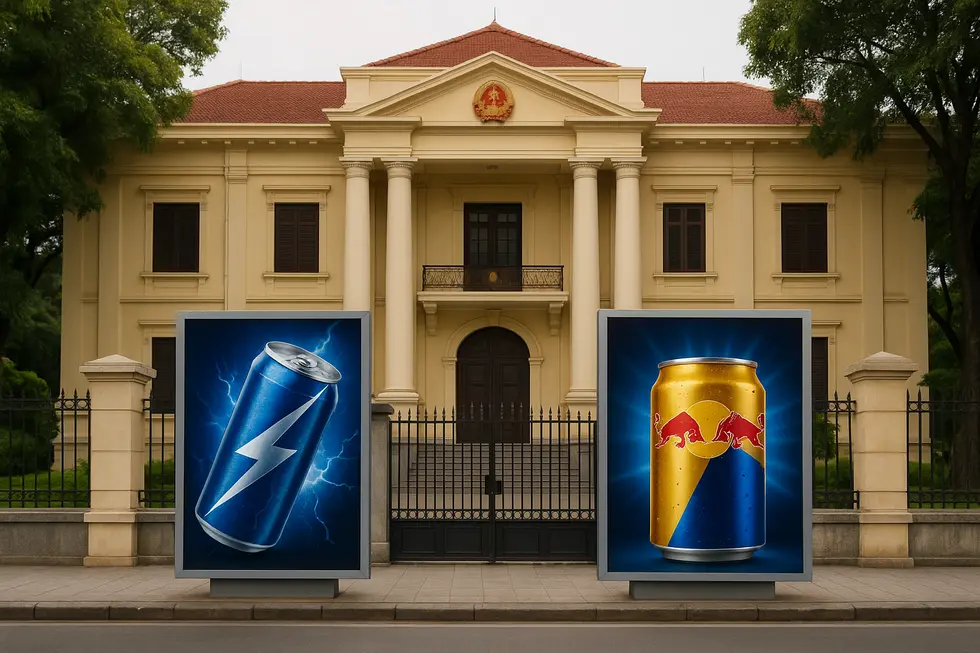
Navigating the regulatory landscape of Vietnam presents a distinctive set of challenges for energy drink exporters like Red Bull. The impending implementation of an excise tax on sugary drinks, set to commence in 2027, marks a pivotal shift in the country’s fiscal approach to energy beverages. This tax, starting at 8% in 2027 and rising to 10% by 2028, directly impacts drinks exceeding 5 grams of sugar per 100 milliliters. Energy drinks, notable for their high sugar content, will find themselves squarely within the new tax bracket, increasing operational costs or diminishing price competitiveness if passed onto consumers[^1].
Additionally, Vietnam’s broader regulatory focus is expanding into environmental sustainability. While the newly introduced Emissions Trading Scheme (ETS) primarily targets heavy emitters like the power and steel sectors, its ripples could extend to beverage companies, emphasizing carbon footprint disclosures and sustainable practices in packaging over time[^3][^5]. Although Red Bull operates outside the initial scope of this scheme, the broader environmental mandate hints at a future where responsible production and packaging could play a significant role in maintaining market position.
For Red Bull, this evolving regulatory air underscores the need for strategic pivots. Adjusting market strategies to either absorb added costs or emphasize products with reduced sugar content could be crucial. Beyond this, staying ahead in regulatory compliance, especially with potential shifts in environmental policies, will be essential for long-term competitiveness. As Vietnam continues to align itself with international standards, companies must be proactive in adapting to ensure sustained growth within this dynamic market.
For deeper insights into the typical ingredients of Red Bull’s products, which could influence such regulatory implications, refer to Red Bull Energy Drink Ingredients and Nutrition Facts.
Navigating Red Bull Export Dynamics: A Tale of Two Neighboring Titans
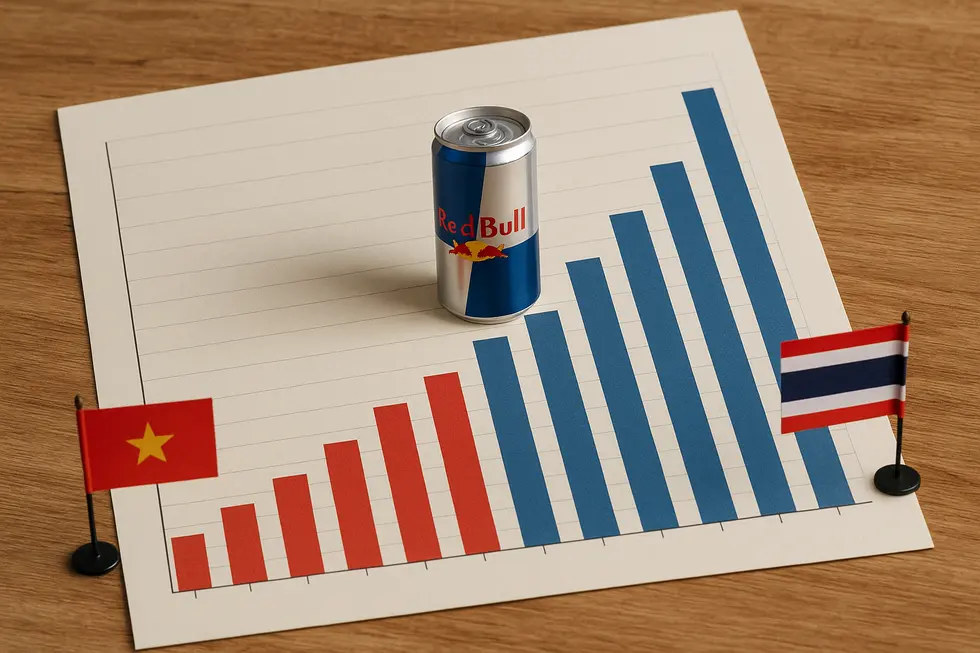
Red Bull’s presence in Southeast Asia, particularly through Thailand and Vietnam, presents a fascinating dynamic shaped by their respective market conditions and operational strategies. Thailand is a notable hub for Red Bull exports, thanks to its historical ties to Krating Daeng, the local iteration of the energy drink introduced in 1976. This unique formulation, often referred to as “Thai Red Bull,” boasts distinct taste differences and a business model offering higher margins, making it a preferred option for wholesalers targeting unique markets across Asia and beyond. Interested parties can explore more about Thai Red Bull’s appeal and distribution models through efficient logistics channels such as Asia Grocery Co., Ltd., which utilize varied exporting methods like FCL and LCL, complemented by flexible payment options such as T/T and L/C.^1
Contrastingly, Vietnam stands as a vibrant market with a distinct focus on exporting a range of energy drinks, albeit not the Red Bull brand itself. This absence of a local variant like Krating Daeng shifts Vietnam’s focus towards strict adherence to international standards, emphasizing sustainability in its export operations. As Vietnam engages with major markets, it encounters challenges related to environmental compliance and low emissions. Meeting these global standards forms a crucial part of maintaining Vietnam’s competitiveness in the energy drink sector. For those interested in the broader green transition challenges facing Vietnam’s export markets, further insights can be found here.
In conclusion, while Thailand benefits from a well-entrenched local product and efficient logistics facilitating global reach, Vietnam navigates a path focused on evolving sustainability paradigms. Each region offers unique lessons on adapting to their respective market energies, potentially enriching strategies for other energy brands looking to expand within Southeast Asia.
Unlocking the Potential of Red Bull Exports from Vietnam to Southeast Asia
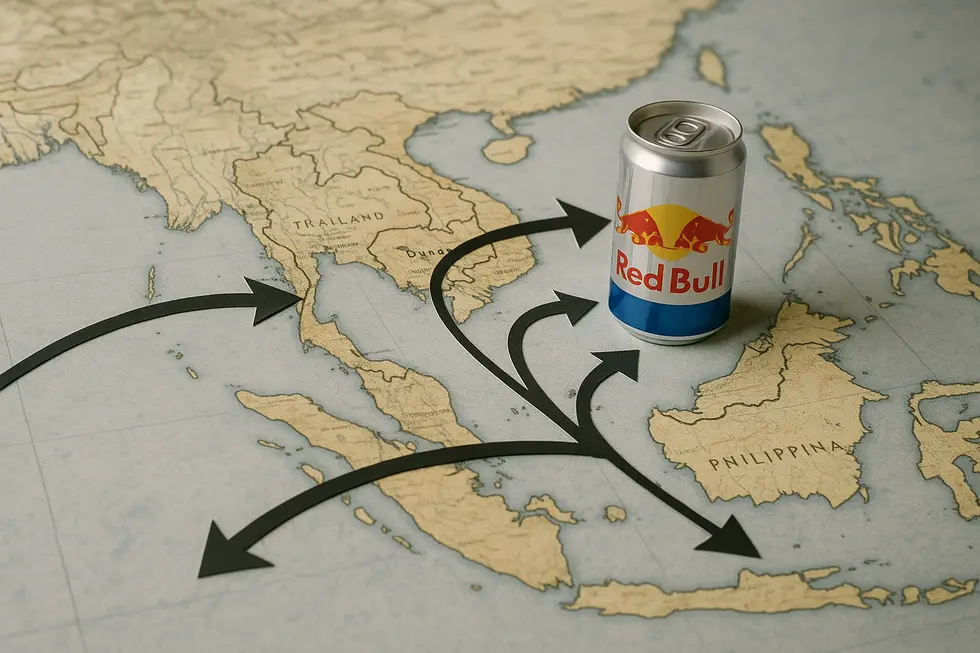
The Southeast Asian market offers a landscape filled with rich opportunities and challenges for Red Bull Vietnam as an exporter. With a bustling consumer base marked by rapid urbanization and increasing health consciousness, energy drinks are in higher demand than ever. Despite the stiff competition from other effective brands like Sting, understanding and adapting to local tastes offers a strategic advantage for Red Bull in solidifying its presence.
Leveraging local partnerships is essential in product adaptation. By working with regional businesses, Red Bull can customize its offerings to appeal to diverse consumer preferences—be it through introducing new flavors or varying product sizes. This strategy is reminiscent of the variations seen with the Krating Daeng formula in Thailand. Such initiatives not only enhance consumer engagement but also improve competitiveness among other energy drink options available in the market.
Logistics play a crucial role in the export potential of Red Bull from Vietnam. The region’s logistical infrastructure is rapidly evolving, making it more efficient and reliable for export operations. A well-managed supply chain ensures product quality and timely delivery, which are critical metrics for performance in the energy drink market. Forming alliances with local logistics providers can significantly expand Red Bull’s reach throughout Southeast Asia, taking full advantage of Vietnam’s strategic geographical position.
Branding and marketing further play a pivotal role in capturing the market’s attention. Red Bull is synonymous with high-energy events and extreme sports—an image that resonates particularly well with the younger demographic across Southeast Asia. Engaging with local events and digital platforms can amplify brand visibility and consumer loyalty. Promoting the unique energy-boosting properties through these channels ensures Red Bull stands out in a crowded marketplace.
For a deeper understanding of Red Bull’s journey and its connection to Southeast Asian markets, including the origins of Krating Daeng, consider visiting this detailed history.
Final thoughts
Red Bull’s potential as a Vietnamese exporter is promising, given the country’s vibrant market dynamics and strategic locale. By aligning with Vietnam’s regulatory standards and understanding comparative advantages with Thailand, Red Bull can expand its footprint in Southeast Asia and beyond. This potential growth represents a significant opportunity for wholesale importers seeking reliable products in an evolving market.
Work with Vietnam’s trusted Red Bull exporter. Request a quote now and enjoy certified supply at competitive rates.
About us
Asia Grocery Co., Ltd is a trusted distributor, wholesaler, and exporter of fast-moving consumer goods (FMCG) from Vietnam, backed by over 20 years of expertise. We deliver authentic products from globally recognized brands such as P&G, Unilever, Redbull, Coca-Cola, Pepsi, Asiadeli, along with traditional and culturally significant Asian products, catering to customers worldwide with a special focus on Vietnamese and Asian communities abroad.

